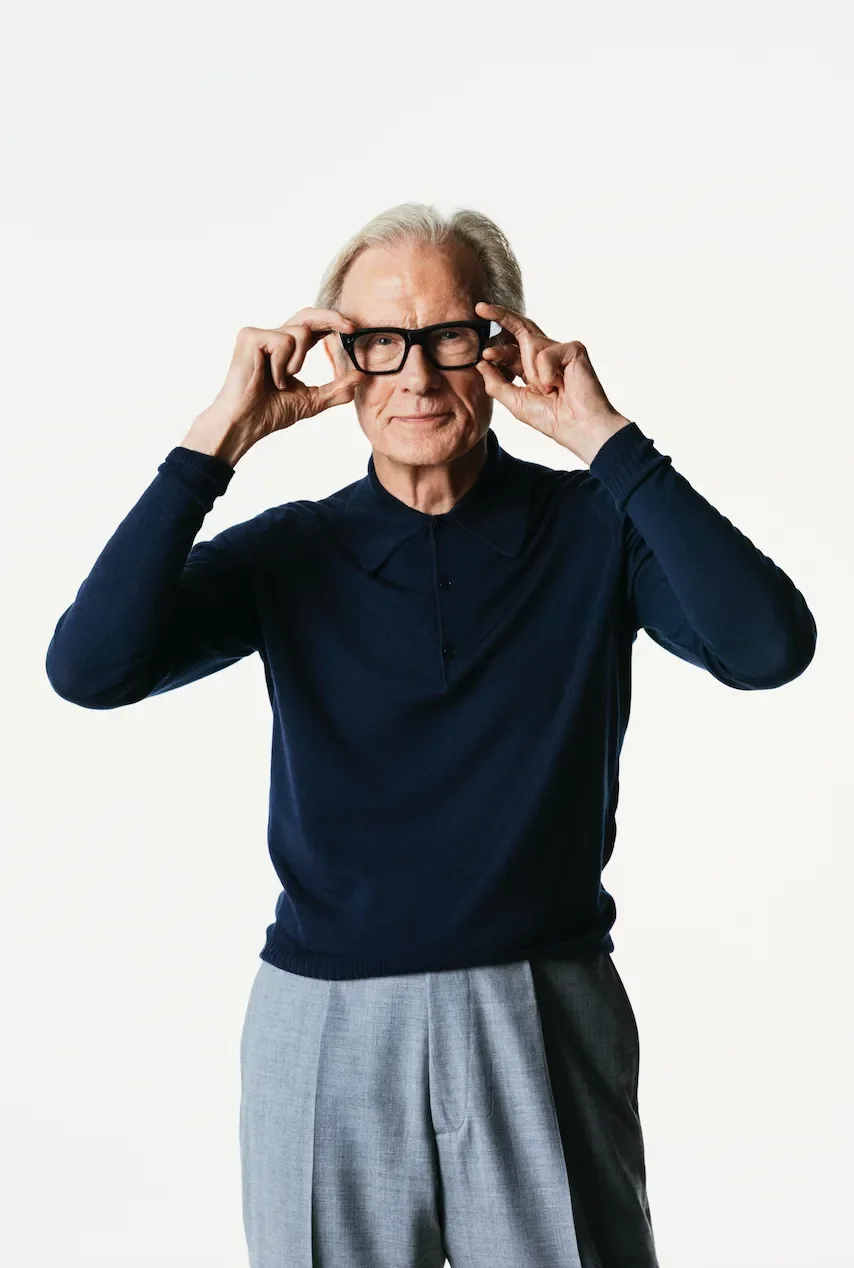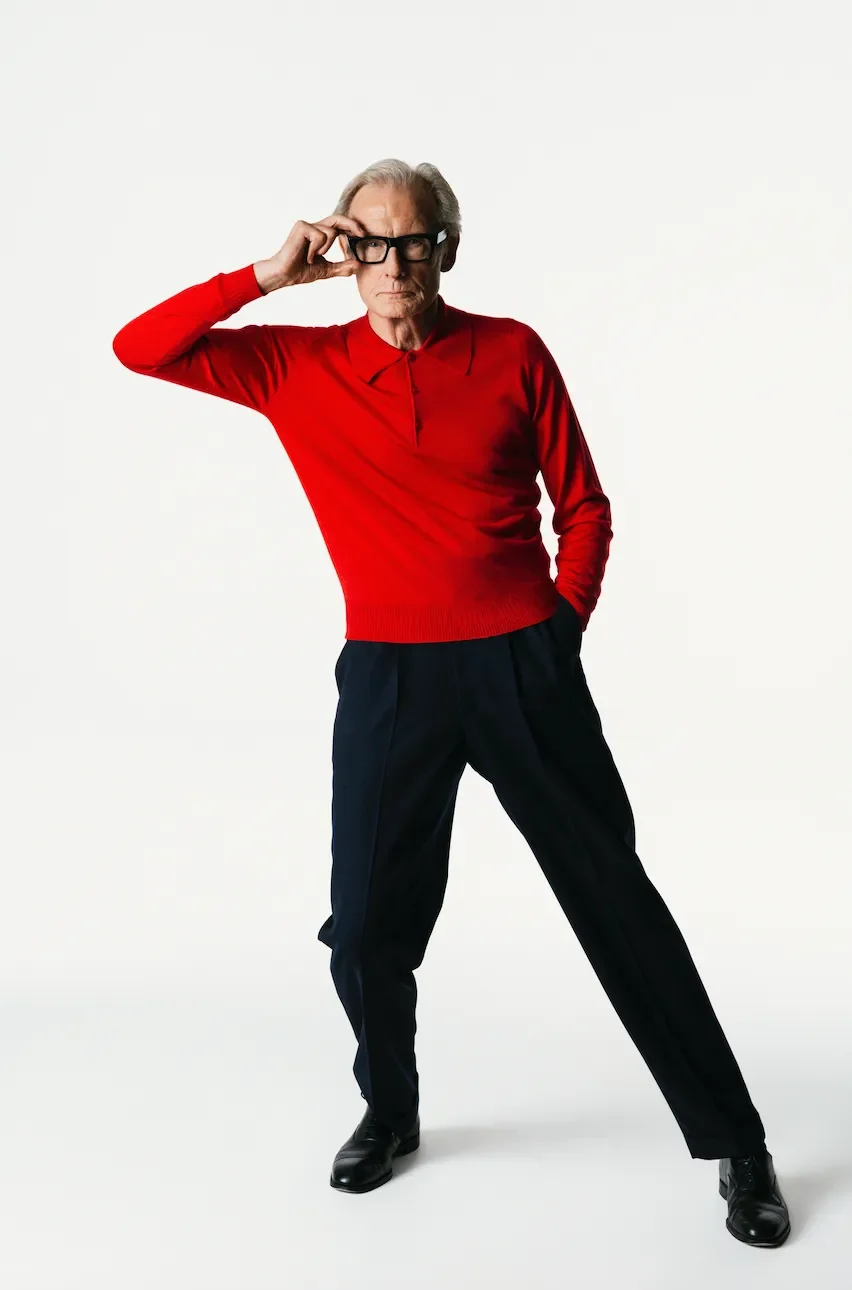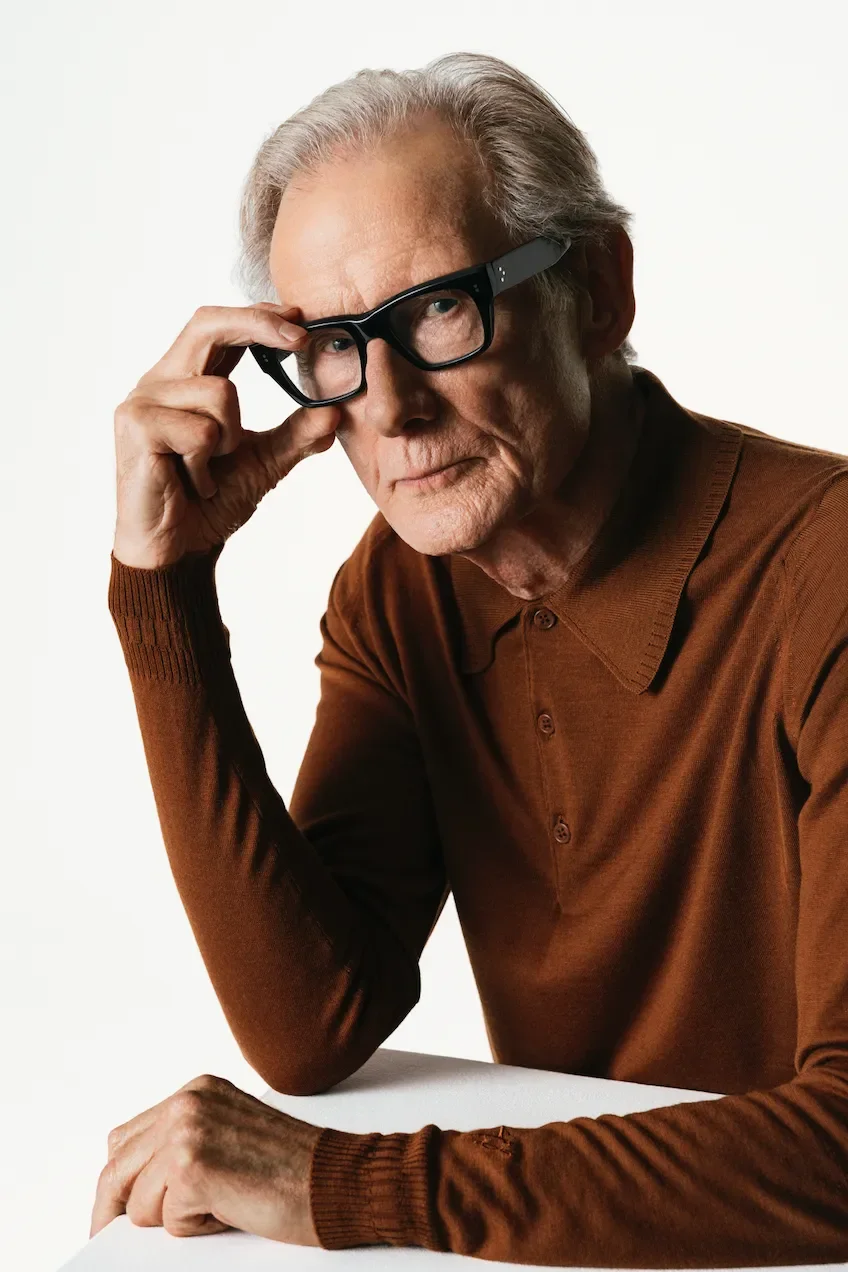BRITISH VOGUE: BILL NIGHY X JOHN SMEDLEY
“Knees are a private business”: Bill Nighy on good trousers, terrible advice and his love of knitwear
By Olivia Allen
Grooming by Joe Mills
My first introduction to Bill Nighy came via the vaguely lecherous “washed-up pop star” he so expertly plays in the backbone of the British Christmas canon, Love Actually. I was probably (definitely) too young to understand any of the jokes, but since that first fateful viewing, I’ve watched it enough times to recite the script start to finish - a limited-use party trick that’s not particularly enjoyable for whoever’s watching it with me. Despite my repertoire of comfort films diversifying, Nighy has remained a constant: whether I’m hysterically crying through About Time or rewatching Emma and Chalet Girl for the millionth time, his unique breed of British stoicism and understated style is always there.
Beyond his extensive acting credits, Nighy has become quietly famous for his no-nonsense opinions on the machinations of life and regular sightings in and around London cafés. Meanwhile, his penchant for clothes has led to a partnership with heritage knitwear brand, John Smedley. The love story between Nighy and Smedley dates back over five decades, with the actor stepping out of the role of long-time wearer and into the creative collaborator seat to produce a collection of’ 40s-inspired twinsets and long johns, in addition to the merino and cashmere classics.
Dotted with discreet doodles and a “Stay Modern” mantra woven into the collection, Nighy hopes he “hasn’t done anything to disturb the average customer”, adding that “the people who buy John Smedley are pretty committed to the brand, but I’ve committed to crimes”. For anyone in need of more sage soundbites from the star, you’re in luck. Launching on 9th October, Ill-Advised by Bill Nighy is the podcast putting the actor in the hot seat, with listeners free to call in for words of wisdom, no matter how trivial. Getting a head start on proceedings, British Vogue sat down with Nighy to discuss his mod origins, what makes a decent pair of trousers and why it’s never acceptable to be sock-less.
What was your first experience with John Smedley?
When I was young, I aspired to being a mod - but I had difficult hair, which partially disqualified me. One of the essential items back then was a John Smedley three-button leisure polo. They were quite expensive, so I’d save up for them - I had a jam jar on my shelf where I’d put money away each week for a new colour. Part of me, irrational as it is, believes I invented the idea of wearing a John Smedley polo under a jacket.
How did you find collaborating on the collection?
When John Smedley called, I honestly thought it was an April Fool’s joke. It felt beautifully symmetrical - the brand had been part of my life since I was a teenager. I wanted to make sure I wasn’t just window dressing, so I asked my agent to tell them I wanted to take four inches off the men’s cardigan - mostly to get their attention. I’ve always thought cardigans were too long - you end up folding them or tugging at the hem.
And then there are the birds. I’ve always doodled birds on my scripts when I’m meant to be learning lines - a way of taking an illegal break from work. They asked if I doodled anything, and I sent them my best ones. They’re now called Peter and George, and they appear subtly at the back of garments. It’s not a logo, just a quiet “hello”. I hope people find it chic rather than alarming.
Is there anything from your wardrobe you’d love to bring back or banish forever?
Years ago, I spent all my money on a dark-blue double-breasted Giorgio Armani suit. I wore it until it fell apart and loved it with all my heart. I’d bring that back, though I might have to reduce the shoulder width to fit through modern doorways.
As for banishing, those shiny black leggings - the rock chic sort that look PVC but aren't. And shorts. I’ve never worn shorts - not since I was a boy. I don’t see why I’d start now. Knees are a private business. I’ve no wish to impose mine on the world.
Speaking of trousers, you’ve mentioned you’re quite particular about them.
Yes, I love trousers. Generous ones that swing and flow - not the kind that grip. When I do period films, I’m always relieved if the story’s set post 1814 so I can avoid breeches. I’ve managed to dodge knickerbockers my whole career.
Are there any historic trousers you’d want to wear - metaphorically or physically?
Metaphorically, I’d quite like to wear the trousers of David Niven. The man had immaculate style and exquisite manners. Physically, perhaps the high-waisted pleated trousers from the 1940s. Wide, elegant, practical. Nobody’s improved on them since.
Does your approach to getting dressed change day to day?
No, I’m quite steadfast. The only real decision is whether to wear a suit or not. I remember reading Andy Warhol describing how he’d go to Bloomingdale's every year and buy a hundred pairs of identical white Y fronts. He’d look at all the psychedelic options, then take the same ones he always bought. I was impressed - both by the commitment and the fact he could afford a hundred pairs. When I was young, my friend John had seven suits - one for every day of the week - and I vowed that if I ever made money, I’d do the same. Eventually, I did.
The photographer Angela Hill does that: she buys seven outfits a season for each day of the week.
That’s an excellent idea. I admire that kind of discipline.
Let’s talk about your podcast. It’s about advice - giving it, receiving it and bad advice. How do you feel about dishing out wisdom?
The idea is that I don’t know the answers - I’m just talking. I try not to sound profound; it’s bad manners to fake wisdom. I mostly answer trivial questions - about socks, plants, things like that. Someone once asked if it’s ever acceptable to go out without socks. Obviously, the answer is no. I’m amazed anyone has to ask.
How about flip-flops?
Flip-flops are fine - they’re honest. but shoes without socks? I just don’t trust you.
What’s the worst bit of advice you’ve ever received?
People don’t give me much advice anymore. That’s the downside of getting older: people start asking you for advice. When people ask me for “advice for the young”, I always say: don’t take drugs and pay your taxes. It sounds flippant, but it’s solid. Advice is risky business. I wish someone had told me that clearly when I was younger.







